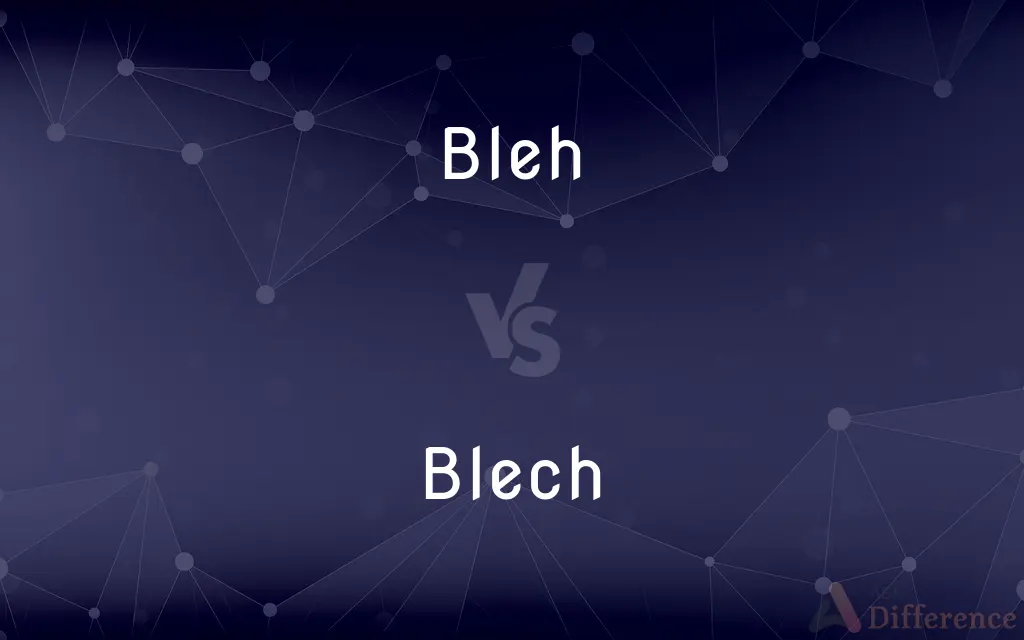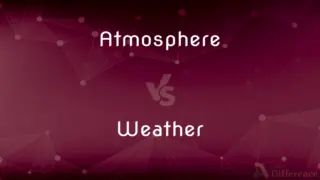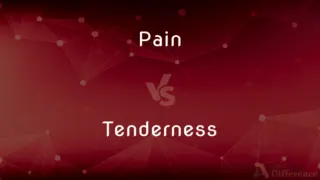Bleh vs. Blech — What's the Difference?
By Tayyaba Rehman & Fiza Rafique — Updated on May 6, 2024
"Bleh" expresses indifference or mild disappointment, typically used casually in conversation, whereas "blech" connotes a stronger sense of disgust or disdain, often related to unpleasant tastes or smells.

Difference Between Bleh and Blech
Table of Contents
ADVERTISEMENT
Key Differences
"Bleh" is a colloquial expression signaling moderate dissatisfaction or lack of enthusiasm about a subject. On the other hand, "blech" is more expressive and is used to indicate a visceral reaction to something distasteful or repulsive.
In everyday usage, "bleh" might be used to describe a boring movie or a mundane task, suggesting a tepid, unenthusiastic response. Whereas, "blech" could be used to describe someone's reaction to spoiled food or an offensive odor, embodying a stronger, more immediate sense of disgust.
"Bleh" can also serve as a placeholder in conversation when the speaker is unsure, uninterested, or too lazy to provide a detailed response. In contrast, "blech" is almost always associated with an active rejection or a strong negative response to sensory experiences, particularly taste and smell.
While "bleh" is versatile in expressing general dissatisfaction, it lacks the intensity and specificity of "blech", which is compellingly used to denote physical revulsion. "Blech" thereby emphasizes a more potent emotional and physical reaction.
Despite their differences, both "bleh" and "blech" are informal and primarily used in spoken language, not suitable for formal contexts. They effectively convey different degrees and types of disapproval in casual conversation.
ADVERTISEMENT
Comparison Chart
Definition
Expression of indifference or mild disappointment
Expression of disgust or disdain
Context of Use
General dissatisfaction, boredom, or disinterest
Strong negative reaction, especially to taste/smell
Intensity
Mild
Strong
Emotional Response
Tepid, unenthusiastic
Revulsion, rejection
Suitability in Speech
Casual conversation
Casual conversation, with an emphasis on disgust
Compare with Definitions
Bleh
Lack of interest.
He asked about my weekend, but it was so bleh I had little to say.
Blech
Expression of disgust.
Blech, this milk has gone sour!
Bleh
Non-committal response.
When asked about going out tonight, I just said 'bleh'.
Blech
Strong disapproval.
They chose that design? Blech!
Bleh
Expression of indifference.
I felt bleh about the movie; it was neither good nor bad.
Blech
Reaction to bad taste.
Blech, this soup is way too salty.
Bleh
General dissatisfaction.
My day was just bleh; nothing exciting happened.
Blech
Verbal expression of physical revulsion.
Seeing that mess made me go 'blech'.
Bleh
Mild disappointment.
The concert was sort of bleh, not what I expected.
Blech
Demonstrative disdain.
Blech, I can't believe you like that movie.
Bleh
(slang) Used to reflect general indifference to a situation or topic.
- What did you think of the movie?
- Bleh. You?
- Bleh. You?
Blech
A blech (from the Yiddish word בלעך (blekh) meaning "tin" or "sheet metal") is a metal sheet used by many observant Jews to cover stovetop burners (and for some, the cooker's knobs and dials) on Shabbos (the Jewish Sabbath), as part of the precautions taken to avoid violating the halachic prohibition against cooking on the Sabbath.
Bleh
(slang) An expression of mild disgust, possible imitative of vomiting
Blech
(slang) An imitation of the sound of gagging, used to express disgust or disdain.
Blech! Look at all those maggots!
Bleh
(slang) Mildly uncomfortable; not good.
I'm feeling a bit bleh.
Blech
(slang) To have the vomiting reflex triggered.
Blech
(Judaism) A metal sheet used to cover stovetop burners on Shabbat to allow food to be kept warm without violating the prohibition against cooking.
Common Curiosities
Are these terms suitable for formal writing?
No, both "bleh" and "blech" are informal and generally not suitable for formal writing.
What does "bleh" generally express?
"Bleh" generally expresses a sense of indifference or mild disappointment.
Is "bleh" a strong expression?
No, "bleh" is not a strong expression; it conveys mild emotions.
What is the emotional intensity of "blech"?
"Blech" carries a strong emotional intensity, often related to physical disgust.
Does "blech" imply a physical or emotional response?
"Blech" often implies a physical response, especially one of revulsion to sensory experiences.
Can "blech" be used to describe feelings about a movie?
While it's less common, "blech" can be used to describe strong disapproval of a movie, especially if it's particularly distasteful or offensive.
Does "blech" always indicate negativity?
Yes, "blech" typically indicates negativity, particularly disgust or strong disapproval.
How does "bleh" relate to enthusiasm?
"Bleh" relates to a lack of enthusiasm, indicating a tepid or indifferent attitude.
Can "bleh" indicate satisfaction?
No, "bleh" does not typically indicate satisfaction; it's used for expressing less-than-positive feelings.
In what context is "blech" commonly used?
"Blech" is commonly used to express disgust, particularly in response to unpleasant tastes or smells.
What types of feelings does "blech" usually convey?
"Blech" usually conveys feelings of disgust, disdain, or strong disapproval.
Can "bleh" and "blech" be interchanged?
Generally, "bleh" and "blech" are not interchangeable due to their different levels of emotional intensity and specific contexts.
Is "blech" a reaction to physical or abstract concepts?
"Blech" is primarily a reaction to physical concepts, especially tastes and smells.
How versatile is "bleh" in conversation?
"Bleh" is quite versatile and can be used in various contexts to express general disinterest or dissatisfaction.
Can "bleh" be used playfully?
Yes, "bleh" can be used playfully to make light of one's unenthusiastic feelings.
Share Your Discovery

Previous Comparison
Atmosphere vs. Weather
Next Comparison
Pain vs. TendernessAuthor Spotlight
Written by
Tayyaba RehmanTayyaba Rehman is a distinguished writer, currently serving as a primary contributor to askdifference.com. As a researcher in semantics and etymology, Tayyaba's passion for the complexity of languages and their distinctions has found a perfect home on the platform. Tayyaba delves into the intricacies of language, distinguishing between commonly confused words and phrases, thereby providing clarity for readers worldwide.
Co-written by
Fiza RafiqueFiza Rafique is a skilled content writer at AskDifference.com, where she meticulously refines and enhances written pieces. Drawing from her vast editorial expertise, Fiza ensures clarity, accuracy, and precision in every article. Passionate about language, she continually seeks to elevate the quality of content for readers worldwide.
















































